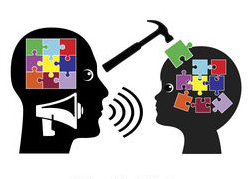|
with harsh teachers is that, although they get the most out of their students, such results are obtained in a questionable way, and come at a heavy price. To the contrary, a new study proposes that authoritarian "controlling" teachers do not only hurt their students' psychology, but also their performance.
Teachers are controlling "when they ignore students’ perspectives and behave in authoritarian and pressuring ways in order to impose a specific and preconceived way of thinking, feeling, and behaving". However, such pressure can be counterproductive and undermine student achievement, according to Self-Determination Theory (SDT), because of its negative impact on motivation. SDT "suggest[s] that the negative impact of controlling teaching environments occurs because such contexts thwart students' basic psychological needs. Three such needs are identified, those for autonomy, competence, and relatedness." Satisfied, these basic psychological needs lead to intrinsic motivation and optimal performance, while their frustration can lead to amotivation and sub-optimal performance. More specifically, this lack of motivation can be due to a defensive behavior known as "challege avoidance." In a first study, the researchers used three different scales to survey over 400 PE students from 5 Greek middle schools. The first one, the Controlling Coach Behaviors Scale, asked participants to rate their agreement with such statements as "My PE teacher shouts at me in front of others to make me do certain things”. Next, the Psychological Need Thwarting Scale did the same with assertions related to autonomy (e.g., "During PE class, I feel pushed to behave in certain ways”), competence (e.g., “During PE class there are situations in which I am made to feel incompetent”), and relatedness (e.g., “During PE class, I feel I am disliked”). Finally, the Revised Perceived Locus of Causality in Physical Education scale assessed different types of motivation by asking students to indicate the degree to which they engaged in PE class activities for intrinsic (e.g., “Because it is enjoyable”), identified (e.g., “Because it is important to me to do well in PE”), introjected (e.g., “Because I would feel bad if I did not do it”), and external (e.g., “Because in this way I will not get a low grade”) reasons as well as the absence of any reason (i.e., amotivation; e.g., “I don't see why we should have PE”). Confirming the authors' hypothesis, perceived teacher control was found to be related to need frustration, which correlated negatively with autonomous motivation and positively with controlled motivation and amotivation. In a second study, the researchers focused on the cognitive, affective, and behavioral impact of controlling teaching. Repeating the same procedure, the team surveyed 447 PE students from 4 Greek middle schools using three new scales: the Performance Failure Apparaisal inventory, asking student to rate their agreement with such statements as “When I am failing, I worry about what others think about me"; the Contigent Self-Worth scale, which did the same, e.g., with “My self-esteem is influenced by my performance in PE lessons”; and finally the Challenge Avoidance Scale, which proposed, e.g., “If I don't succeed at a task in PE for the first time, I stop trying”. Once again, the researchers' expectations were confirmed: controlling teaching was found to be statistically related to fear of failure, contingent self-worth, and the defensive coping strategy known as "challenge avoidance." Interestingly, the effect proved to be weaker on girls than on boys. Source: Bartholomew et alia (2018)
0 Comments
Your comment will be posted after it is approved.
Leave a Reply. |
|
Proudly powered by Weebly

